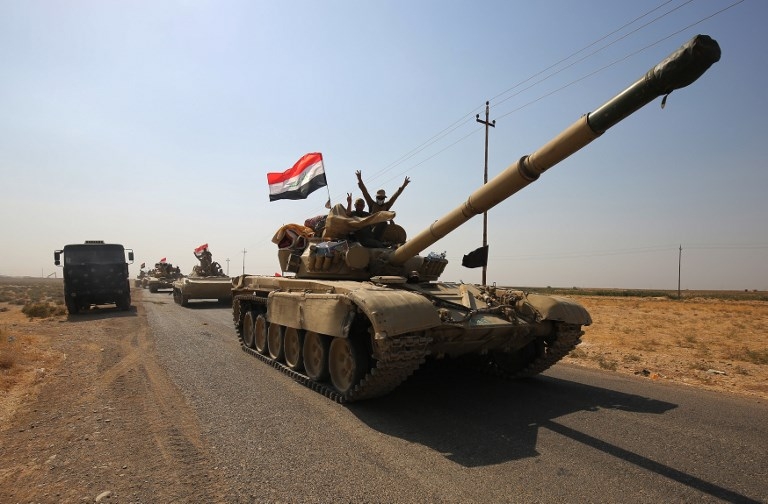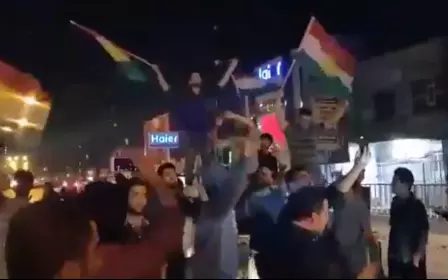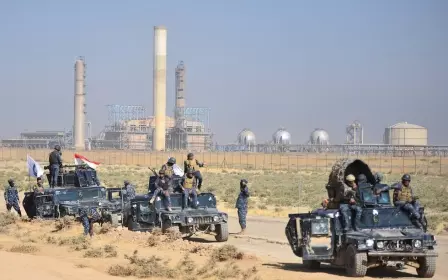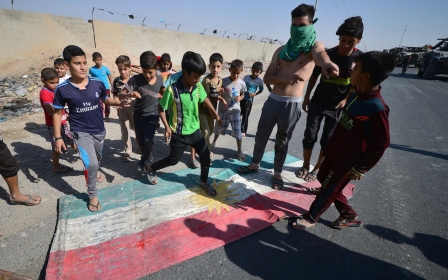Iraq claims full control of Kirkuk province after clashes

Iraqi forces took control on Friday of the last district in the oil-rich province of Kirkuk still in the hands of Kurdish Peshmerga fighters following a three-hour battle, security sources said.
The district of Altun Kupri, or Perde in Kurdish, lies on the road between the city of Kirkuk - which fell to Iraqi forces on Monday - and Erbil, capital of the semi-autonomous region of Kurdistan that voted in a referendum last month to secede from Iraq against Baghdad's wishes.
A force made up of US-trained Iraqi Counter-Terrorism Service units, Iranian-backed Popular Mobilisation and Federal Police began their advance on Altun Kupri at 7:30 am, said an Iraqi military spokesman.
"Details will be communicated later," the spokesman said in a short posting on social media.
"The army, police and counter-terrorism forces entered the centre of the Altun Kupri region," just 50km from the Iraqi Kurdish capital of Erbil, a security official said, asking not to be named.
"There were clashes but they managed to launch the assault... and hoist the flag on the municipality building."
Kurdish Peshmerga forces withdrew from the town of Altun Kupri, located on the Zab river, after battling the advancing Iraqi troops with machine guns, mortars and rocket propelled grenades, security sources said.
It was not immediately clear whether there had been any casualties in the fighting.
Civilians killed
But the claims come as Human Rights Watch reported hospital staff as saying at least five civilians were killed and 51 wounded as Iraqi forces took Tuz Khurmatu, south of Kirkuk city, on 16 October.
The rights group added that Iraqi forces had let civilians loot property unimpeded for at least a full day before taking action.
“Iraqi and Kurdish forces need to resolve the current crisis in ways that fully respects human rights and avoids harming civilians or their property,” said Joe Stork, deputy Middle East director at Human Rights Watch.
Four Tuz residents said the clashes were heaviest in the Turkmen areas of the city because of the proximity to both Iraqi and Kurdish military and security installations.
The Iraqi forces have advanced into Kirkuk province largely unopposed as most Peshmerga forces withdrew without a fight.
The fighting at Altun Kupri marked only the second instance of significant violent resistance by the Kurds in Kirkuk province since Monday.
Altun Kopri marks the administrative limit between Kirkuk and Erbil. It belongs administratively to the Kirkuk province.
Iraqi forces are seeking to reestablish Baghdad's authority over territory captured by the Kurdish Peshmerga outside the official boundaries of the Kurdistan region in the course of the war on Islamic State (IS) group militants.
The Peshmerga had moved into Kirkuk after the Iraqi army fled the region in the face of IS's advance in 2014. The Kurdish move prevented Kirkuk's oil fields from falling into the hands of the militants.
On Friday, the US State Department urged the Baghdad government to avoid clashes in northern Iraq by limiting the movement of federal troops in disputed areas to those coordinated with the Kurdistan Regional Government.
In a statement, it said Washington was concerned by reports of violent clashes around the town of Altun Kupri. "The reassertion of federal authority over disputed areas in no way changes their status – they remain disputed until their status is resolved in accordance with the Iraqi constitution," it said.
Iraqi forces on Friday took control of the last district in the oil-rich province of Kirkuk still in the hands of Kurdish Peshmerga fighters following a three-hour battle, security sources said.
New MEE newsletter: Jerusalem Dispatch
Sign up to get the latest insights and analysis on Israel-Palestine, alongside Turkey Unpacked and other MEE newsletters
Middle East Eye delivers independent and unrivalled coverage and analysis of the Middle East, North Africa and beyond. To learn more about republishing this content and the associated fees, please fill out this form. More about MEE can be found here.




